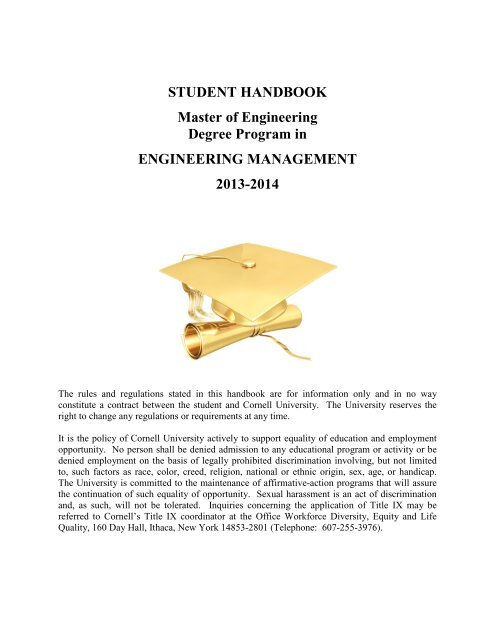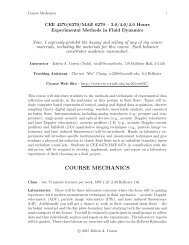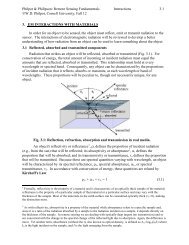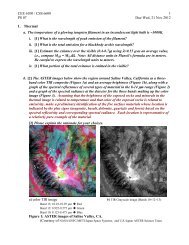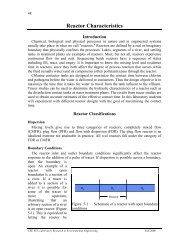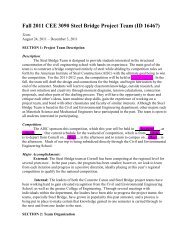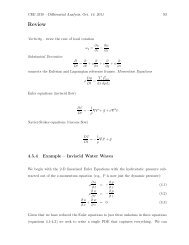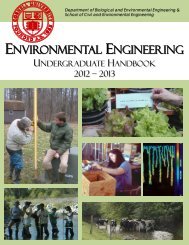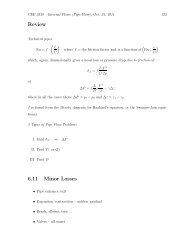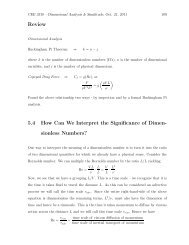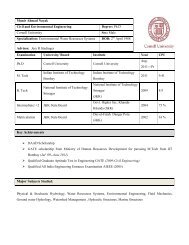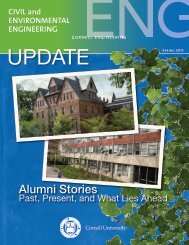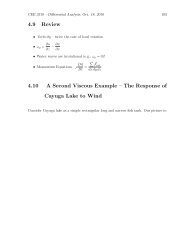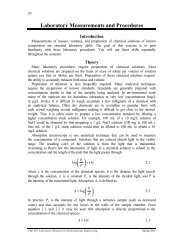Handbook 2013-14 - Civil & Environmental Engineering - Cornell ...
Handbook 2013-14 - Civil & Environmental Engineering - Cornell ...
Handbook 2013-14 - Civil & Environmental Engineering - Cornell ...
Create successful ePaper yourself
Turn your PDF publications into a flip-book with our unique Google optimized e-Paper software.
STUDENT HANDBOOK<br />
Master of <strong>Engineering</strong><br />
Degree Program in<br />
ENGINEERING MANAGEMENT<br />
<strong>2013</strong>-20<strong>14</strong><br />
The rules and regulations stated in this handbook are for information only and in no way<br />
constitute a contract between the student and <strong>Cornell</strong> University. The University reserves the<br />
right to change any regulations or requirements at any time.<br />
It is the policy of <strong>Cornell</strong> University actively to support equality of education and employment<br />
opportunity. No person shall be denied admission to any educational program or activity or be<br />
denied employment on the basis of legally prohibited discrimination involving, but not limited<br />
to, such factors as race, color, creed, religion, national or ethnic origin, sex, age, or handicap.<br />
The University is committed to the maintenance of affirmative-action programs that will assure<br />
the continuation of such equality of opportunity. Sexual harassment is an act of discrimination<br />
and, as such, will not be tolerated. Inquiries concerning the application of Title IX may be<br />
referred to <strong>Cornell</strong>’s Title IX coordinator at the Office Workforce Diversity, Equity and Life<br />
Quality, 160 Day Hall, Ithaca, New York <strong>14</strong>853-2801 (Telephone: 607-255-3976).
TABLE OF CONTENTS<br />
Section<br />
Page<br />
1 Introduction ........................................................................................................................................ 3<br />
1.1 The <strong>Engineering</strong> Management Program ................................................................................... 3<br />
1.2 The Master of <strong>Engineering</strong> Degree in <strong>Engineering</strong> Management ............................................ 4<br />
1.2.1 Preparation...................................................................................................................... 5<br />
1.2.2 Program Requirements ................................................................................................... 5<br />
2 Planning and Registering for the M.Eng. Program ............................................................................ 7<br />
2.1 Assignment of Advisor ............................................................................................................. 7<br />
2.2 University Registration ............................................................................................................. 7<br />
2.3 Course Registration .................................................................................................................. 8<br />
2.4 Planning your M.Eng. Program ................................................................................................ 8<br />
2.5 Approval of Your Course Program .......................................................................................... 8<br />
2.6 Filing Your Course Program .................................................................................................... 8<br />
2.7 Program Changes ..................................................................................................................... 9<br />
2.8 Petitions .................................................................................................................................... 9<br />
2.9 Financial Aid and Work Obligations ........................................................................................ 9<br />
2.10 Grade Requirements ................................................................................................................. 9<br />
2.11 Office Space, Mail, etc. ............................................................................................................ 9<br />
2.12 Job Placement ......................................................................................................................... 10<br />
2.13 Miscellaneous ......................................................................................................................... 10<br />
3 Professional Conduct and Special Needs ......................................................................................... 11<br />
3.1 Academic Integrity and Plagiarism ........................................................................................ 11<br />
3.2 Persons with Special Needs .................................................................................................... 11<br />
APPENDICES<br />
A. <strong>Engineering</strong> Management Program Faculty ..................................................................................... 12<br />
B. Master of <strong>Engineering</strong> and MBA Programs ..................................................................................... 13<br />
C. Prerequisite Skills in Probability and Statistics ................................................................................ <strong>14</strong><br />
D. Program Requirements and Forms for M.Eng. Degree in <strong>Engineering</strong> Management ..................... 15<br />
E. <strong>Engineering</strong> Management Course Offerings: <strong>2013</strong>-<strong>14</strong> .................................................................... 19<br />
F. Overall List of CEE Course Offerings: <strong>2013</strong>-<strong>14</strong> .............................................................................. 22<br />
- 2 -
SECTION 1<br />
INTRODUCTION<br />
Welcome to <strong>Cornell</strong> University and, in particular, to the College of <strong>Engineering</strong>. We hope your year here will be<br />
both an academically rich and personally rewarding experience. This handbook has been prepared to simplify the<br />
orientation and registration process of new candidates for the Master of <strong>Engineering</strong> degree in <strong>Engineering</strong><br />
Management.<br />
1.1 The <strong>Engineering</strong> Management Program<br />
The <strong>Engineering</strong> Management program has a strong educational tradition. Since its inception in 1988, the program<br />
has attracted students with bachelor’s degrees in all of the various engineering fields. Mechanical, civil, electrical,<br />
computer science, industrial/operations research, chemical, applied and engineering physics, and environmental<br />
engineering students have all been well represented in the program. The engineering faculty who teach in the<br />
<strong>Engineering</strong> Management program and their particular specializations are listed in Appendix A. In addition, we<br />
have more than 600 alumni who hold important positions in engineering, construction, research and development,<br />
manufacturing, sales, education, consulting, and government in the U.S. and around the world.<br />
The <strong>Engineering</strong> Management program is housed in Hollister Hall, which is also home to the School of <strong>Civil</strong> &<br />
<strong>Environmental</strong> <strong>Engineering</strong>. The faculty and other individuals responsible for administering the <strong>Engineering</strong><br />
Management program include:<br />
Director, School of <strong>Civil</strong> & Environ. Engr.: Philip Liu, 220 Hollister; 255-3690<br />
Director of Administration: Joe Rowe, 220 Hollister, 255-0549<br />
Administrative Assistant: Jeannette Little, 220 Hollister, 255-3690<br />
Director of Graduate Studies: James J. Bisogni, Jr.<br />
Chair, Master of <strong>Engineering</strong> Program in <strong>Engineering</strong> Management: Mark Turnquist<br />
Graduate Program Coordinator: Tania Sharpsteen, 219 Hollister, 255-7560<br />
Other Support Staff:<br />
Administrative Assistant: Carl <strong>Cornell</strong>, 220 Hollister, 255-2542<br />
Accounts Administrator: Christina Dovi, 220 Hollister, 255-3684<br />
Accounts Coordinator: Sutapa Ghosh, 220 Hollister, 255-6192<br />
Building Coordinator: Paul Charles, B56 Hollister, 351-3210<br />
Computer Operations Manager: Cameron Willkens, B55 Hollister, 351-6211<br />
3
1.2 The Master of <strong>Engineering</strong> Degree in <strong>Engineering</strong> Management<br />
The Master of <strong>Engineering</strong> degree is a coursework and project-oriented program. It requires thirty (30) credit hours<br />
consisting of coursework in major and supporting areas, and a project. The Master of <strong>Engineering</strong> degree can be<br />
completed in two semesters of intensive study, but for some students a third semester may be necessary.<br />
The program is aimed at engineers who want to operate in a technical environment, but who also want to advance in<br />
managerial roles. Students learn to identify problems, analyze data, and formulate models to understand these<br />
problems, and interpret the results of analyses for managerial action. Identifying problems often requires managing<br />
data, and transforming data into information. Such data and information can be used as the basis for modeling, and<br />
the models generate insights that help us to understand problems and identify opportunities. Understanding is the<br />
foundation of making good managerial decisions. This thread: data → information → models → decisions underlies<br />
the structure and philosophy of the <strong>Engineering</strong> Management program at <strong>Cornell</strong>.<br />
<strong>Engineering</strong> Management is a<br />
Problem-Solving, Project-Orientated Activity<br />
requiring both people skills and technical skills<br />
Data<br />
Information<br />
Models<br />
Decisions<br />
Considering:<br />
Opportunities<br />
Resources<br />
Finances<br />
Constraints<br />
People<br />
The business context of the issues and decisions with which students will deal is important, and the program mixes<br />
courses from the <strong>Engineering</strong> College with courses from the Johnson Graduate School of Management and the<br />
School of Industrial and Labor Relations to provide that larger context.<br />
Management responsibilities in a technical environment (and increasingly in many business environments) are often<br />
focused on projects, where a combination of resources (people, equipment, money, etc.) must be brought together to<br />
achieve a specific outcome within both schedule and budget constraints. This importance of projects is reflected in<br />
this program through a strong focus on project management – the combination of “people skills” and “technical<br />
skills” necessary to make projects successful.<br />
Because the program is designed to appeal to students from different disciplinary backgrounds, and who are aiming<br />
at different career paths, the core tools taught in the program are augmented by a set of specialization courses that<br />
allow students to develop expertise in particular application areas. Some students select these specialization courses<br />
to focus on a disciplinary specialty (e.g., wireless communications in Electrical and Computer <strong>Engineering</strong>,<br />
construction operations in <strong>Civil</strong> & <strong>Environmental</strong> <strong>Engineering</strong>, software engineering in Computer Science, etc.).<br />
4
Other students focus more on a functional specialty (real estate development, management consulting, energy<br />
systems, infrastructure management, etc.). More detail on how these various program elements are reflected in<br />
specific curricular requirements is in section 1.2.2.<br />
For some students (especially those whose career interests focus on engineering companies), the Master of<br />
<strong>Engineering</strong> degree in <strong>Engineering</strong> Management can be viewed as an effective alternative to an MBA degree<br />
because it is focused on the mix of technical skills and project management skills that are valued highly in many<br />
technical environments. However, for some other students, the combination of the M.Eng. degree and an MBA is<br />
attractive, and <strong>Cornell</strong> offers a joint program between the <strong>Engineering</strong> College and the Johnson Graduate School of<br />
Management leading to both degrees (usually after a total of five semesters). Additional details on this joint<br />
M.Eng./MBA program are provided in Appendix B.<br />
1.2.1 Preparation<br />
Students from all fields of engineering are welcome in the Master of <strong>Engineering</strong> program in <strong>Engineering</strong><br />
Management. The core elements of the program do not require specific knowledge from any particular engineering<br />
discipline. However, in keeping with the data → information → models → decisions thread described above, we do<br />
assume that all entering students will have a basic background in probability and statistics. This is generally satisfied<br />
by a one-semester undergraduate class that many engineering programs require. At <strong>Cornell</strong>, the typical courses used<br />
to satisfy this requirement are ENGRD 2700, CEE 3040 or ECE 3100. Appendix C describes the material that you<br />
should understand to meet this background requirement.<br />
If you have not had a course in probability and statistics as an undergraduate, you may arrange to take such a course<br />
over the summer preceding enrollment as an M.Eng. student, or you will have to take such a course (as an overload)<br />
during the first semester of your M.Eng. program. The credits for this course do not count toward the 30 credits<br />
required to complete the degree. We strongly encourage students to satisfy this preparation requirement prior to<br />
entering the program.<br />
1.2.2 Major Program Requirements<br />
Required Courses:<br />
CEE 5900 – Project Management (Fall or Spring, 4 credits)<br />
CEE 5910 – <strong>Engineering</strong> Management Project (Fall or Spring, 4 credits)<br />
CEE 5930 – <strong>Engineering</strong> Management Methods (Spring, 4 credits)<br />
CEE 5970 – Risk Analysis and Management (Spring, 3 credits)<br />
One course in finance and/or accounting (many students take either NBA 5530 – Accounting and Financial Analysis<br />
for Engineers, ORIE 5150 – Economic Analysis of <strong>Engineering</strong> Systems, or NCC 5560 – Managerial Finance)<br />
One course in individual and/or organizational behavior (many students take CEE 6900 – Creativity, Innovation and<br />
Leadership; NCC 5530 – Marketing Management; NCC 5540 – Mgmt. and Leading in Organizations; NBA<br />
6630 – Managerial Decision Making; NBA 6660 – Negotiations; or ILROB 5200 – Organizational Behavior<br />
& Analysis)<br />
Three specialization courses in either a disciplinary or functional area.<br />
A disciplinary specialization will usually be in the same field as your undergraduate degree. Functional<br />
specializations can vary widely. Appendix D provides examples of functional areas. At least two of the three<br />
specialization courses must be technical in nature, and at least one of the three should be from <strong>Engineering</strong>.<br />
5
Appendix E provides course descriptions for the required courses and the most popular choices of courses in<br />
accounting/finance and organizational behavior. Appendix D provides the proposal form that must be completed by<br />
each student, listing the courses that will be used to satisfy degree requirements.<br />
The information provided should help you make decisions, but we encourage you to seek guidance from your<br />
advisor and other faculty members. An important aspect of the M.Eng. program is interaction between each student<br />
and his/her faculty advisor. Your advisor will work with you to develop a program consistent with your career goals<br />
and the intent of the M.Eng. program.<br />
6
SECTION 2<br />
PLANNING and REGISTERING for the M.ENG. PROGRAM<br />
Enrolling in the M.Eng. program in <strong>Engineering</strong> Management will take relatively little time for most of you. You<br />
will find the process a little more informal than undergraduate registration, with more freedom to change courses<br />
easily during the first three weeks of classes of each semester. The major steps in the process are described in the<br />
following sections.<br />
2.1 Assignment of Advisor<br />
You will have an advisor to help you design a program of study and generally to assist and advise you during your<br />
stay at <strong>Cornell</strong>. Advisor assignments are made prior to you beginning your M.Eng. program. You may also change<br />
your advisor with the permission of the faculty member whom you would like to serve as your new advisor.<br />
You should set up an appointment with your advisor shortly after arriving on campus. It is your responsibility to<br />
establish a relationship with your advisor who must approve the <strong>Engineering</strong> Management program you propose, as<br />
well as any subsequent changes. Please remember that the beginning of the semester is busy for everyone, and your<br />
advisor is responsible for several undergraduate and other graduate students.<br />
2.2 Graduate School Registration<br />
Note that graduate registration at <strong>Cornell</strong> is a two-stage process. First, you must enroll with the Graduate School<br />
and second, you must enroll in courses. The former is on a fixed schedule, while the latter is accomplished over the<br />
first three weeks of each semester.<br />
Graduate School Orientation<br />
Monday, August 26, Barton Hall - 8:00 am-12:00 pm<br />
ID Distribution, Resource Fair, and Graduate School Information<br />
www.gradschool.cornell.edu/welcome-to-cornell<br />
NetID: You should have received your NetID and information from <strong>Cornell</strong> Information Technologies (CIT) over<br />
the summer. If you did not, please contact the CIT Office at HelpDesk@cornell.edu. E-mail messages are one of<br />
the most effective forms of communication. Please check your e-mail regularly in the event that your advisor,<br />
your professors, your colleagues, or the GPC need to get in contact with you.<br />
Social Security Card Application: A representative of the Social Security Administration may be at Bartels Hall<br />
to help international students who are receiving any kind of financial support from <strong>Cornell</strong> apply for a U.S. Social<br />
Security Number (SSN). Bring your passport, visa documents, and a letter from the ISSO office. You may also<br />
apply for a SSN at the local SSA Office at 127 E. State Street. Once you obtain your SSN, take the card to the<br />
Graduate Program Coordinator and the University Registrar’s Office, B-7 Day Hall, to update your <strong>Cornell</strong> record.<br />
7
2.3 Course Registration<br />
Graduate students must register for courses online. You will receive details about online course enrollment upon<br />
registering with the Graduate School. Courses may be added online until September 13th. They may be dropped<br />
online until October 11 th .<br />
Any changes in your course registration after the deadlines (i.e., adds/drops, credit hour changes) requires<br />
submission of a Course Enrollment Petition to the Graduate School. The petition must be signed by both your<br />
advisor and the instructor of the course. Petitions are not automatically approved and, in fact, Graduate School<br />
personnel have indicated that they will be much stricter in approving petitions. Check Just the Facts often after your<br />
course schedule is online to verify that all information is correct, and do not wait until the last minute (2 days before<br />
classes end!) to submit a Course Enrollment Petition.<br />
2.4 Planning Your M.Eng. Program<br />
Please study the pertinent material in this handbook for both required courses and appropriate elective courses<br />
before seeing your advisor. It would be worthwhile to spend some time with the course catalog (in print or online)<br />
to identify possible courses for both the Fall and Spring terms. <strong>Engineering</strong> Management courses for Fall <strong>2013</strong> and<br />
Spring 20<strong>14</strong> are listed in Appendix E. Appendix F lists a larger set of courses offered by <strong>Civil</strong> and <strong>Environmental</strong><br />
<strong>Engineering</strong> that are appropriate for MEng students. There normally are a few changes in course offerings made<br />
after the catalog copy is prepared, and final correct information will be published online and posted by Departments.<br />
In addition, students will want to consult the course listing in the Johnson Graduate School of Management, the<br />
School of Industrial and Labor Relations, and various other departments within engineering.<br />
Program planning is done with the aid of the M.Eng. Proposal Form for <strong>Engineering</strong> Management (see Appendix<br />
D). You will fill this form out with the help of your advisor, who must also sign the form showing his/her approval<br />
of your program. Extra proposal forms can be obtained from the GPC.<br />
Except for seminars, which may be graded on an S/U basis, all courses that count towards the MEng degree must be<br />
taken for a letter grade (A-F). With approval of both your advisor and the <strong>Engineering</strong> Management Director, a<br />
maximum of two S/U-graded credit hours may be allowed, provided the seminars are “participatory” (requires more<br />
than just attending the class).<br />
2.5 Approval of Your Course Program<br />
After a “final” program of courses for the entire year is agreed upon with your advisor, please submit your Proposal<br />
Form to the GPC by September 13th. It will then be forwarded to the Director of the <strong>Engineering</strong> Management<br />
Program for final approval. A copy of the approved program is returned to your faculty advisor. You may pick up a<br />
copy from your student mail folder in 220 Hollister. Original forms stay on file with the GPC.<br />
2.6 Filing Your Course Program<br />
You have approximately three (3) weeks (until September 13, <strong>2013</strong>) to enroll online for Fall <strong>2013</strong> classes. This time<br />
period allows you to sit in on an extra course or two, if you wish, for a couple of weeks to assist you in making up<br />
your mind about your exact program for the term.<br />
8
2.7 Program Changes<br />
Students often propose changes to their program at the start of their second semester that reflect changes in interests<br />
and/or course availability. All changes to your approved M.Eng. program must take the form of a revised proposal.<br />
Revised proposal forms must also be approved by your advisor and the <strong>Engineering</strong> Management Director, and<br />
turned into the GPC.<br />
It is important that any changes in your program be approved promptly because the current version of your proposal<br />
form that is on file serves as a check list for determining compliance with graduation requirements. Program<br />
changes made after the Fall term to take effect in the Spring term should be submitted by February 4, <strong>2013</strong>.<br />
2.8 Petitions<br />
<strong>Cornell</strong> University has a long-standing tradition of considering petitions from students relative to special situations<br />
or circumstances that could justify exceptions to the normal rules or requirements. Most petitions are considered by<br />
the <strong>Engineering</strong> Management Director; others must be submitted to the College Master of <strong>Engineering</strong> Committee<br />
for a decision. The College Committee may also review petitions that are submitted to the <strong>Engineering</strong><br />
Management Director that are not resolved to the satisfaction of the student. While we are not encouraging use of<br />
the petition route to get around requirements, we do want to point out the existence of this process. It gives<br />
everyone the opportunity of stating his/her case for special consideration, and therefore it is a very important part of<br />
the operational procedures for students attending <strong>Cornell</strong> University.<br />
2.9 Financial Aid and Work Obligation<br />
Financial aid administered by the College or School can be in the form of fellowships or half-time assistantships. If<br />
you have the latter, you will be given eight hours per week of teaching assistant-related duties. MEng students<br />
typically serve as graders, hold office hours, prepare class materials, etc. The faculty generally make assistantship<br />
assignments during the first two weeks of classes.<br />
2.10 Grade Requirements<br />
The College requires a minimum grade point average of 2.50 for graduation from the Master of <strong>Engineering</strong><br />
program. Students who are admitted on a Provisional Basis must achieve a 3.00 average during their first term in<br />
the M.Eng. program in order to continue in the second term. Typical graduate student grade point averages are much<br />
higher than this. At <strong>Cornell</strong>, decimal grade points are assigned to grades with (+) or (-), i.e., A+ = 4.3, A = 4, A- =<br />
3.7, B+ = 3.3, etc.<br />
A grade of less than C- in a course will result in no credit being granted toward satisfaction of the 30-hour minimum<br />
requirement. However, these courses are included in calculating grade point averages.<br />
2.11 Office Space, Mail, etc.<br />
The <strong>Engineering</strong> Management students have space allocated in 404 Hollister. This space includes:<br />
- Individual study carrels<br />
- Group study areas<br />
- Eight computer workstations<br />
- Thirty-two individual lockers for storage of books, etc.<br />
- Storage areas above study carrels and computer workstations (not lockable)<br />
- Laptop charging table<br />
- Printers (available via wireless access from your laptops or directly from the work stations)<br />
We do not recommend leaving valuable items in the lockers or storage space above the workstations as they are not<br />
9
very secure.<br />
Entrance into the M.Eng. office is via your ID card. Your ID will also open outside doors to Hollister Hall and the<br />
Graduate Student lounge in Hollister Hall.<br />
Each student will be provided a folder bearing his or her name in the graduate student mail file located in the Main<br />
Office (220 Hollister). You should check your folder frequently, not only for incoming mail, but also for messages<br />
from the <strong>Engineering</strong> Management Chair, your advisor, or other <strong>Cornell</strong> sources such as the Graduate School. This<br />
mail folder is provided for campus mail and notices; you should have your personal mail sent to your local<br />
residential address.<br />
The bulletin board outside of the GPC’s office is specifically for announcements relative to all graduate students and<br />
concentrations within CEE. You should get into the habit of checking the bulletin board on a regular basis. We try<br />
to keep it updated with program topics, seminar speaker announcements, Graduate School notices, and other<br />
important messages.<br />
2.12 Job Placement<br />
We are confident that the background you receive in your M.Eng. program in <strong>Engineering</strong> Management will be of<br />
great assistance to you in the job market. Employers have always been enthusiastic about <strong>Cornell</strong> graduates with<br />
M.Eng. degrees in <strong>Engineering</strong> Management.<br />
The <strong>Engineering</strong> Co-op and Career Services Office (201 Carpenter Hall) offers an extensive recruitment program<br />
with many interviewers coming to campus each year. You should visit this office early in the fall term and take<br />
advantage of the excellent opportunities it offers. The University Career Services Office has a series of special<br />
lectures on how to approach the job market, how to prepare resumes, how to take interviews, etc. Announcements<br />
of these lectures and meetings will be posted throughout Hollister Hall.<br />
Many opportunities also are available with private engineering companies, industries, and agencies that do not<br />
routinely interview on campuses because they are relatively small. Do not hesitate to ask faculty with whom you<br />
work for advice on jobs. Many of the faculty have excellent connections to professional firms and will be happy to<br />
pass along notices they receive about jobs or help you identify potential employers. Job listings and descriptions are<br />
also posted on CEEs website: www.cee.cornell.edu. There are many routes to explore in seeking the right<br />
engineering position; the key point to remember is that you must take the initiative.<br />
2.13 Miscellaneous<br />
The Graduate School will place a “hold” on your diploma if certification of your undergraduate degree has not been<br />
received (official final transcript showing date undergraduate degree was awarded). Holds will also be placed on<br />
your diploma if you have any outstanding debts with the university or have not returned library books. Please make<br />
sure Bursar charges and library fines are paid, all Graduate School paperwork has been processed, and all library<br />
books are returned at least one week before Commencement.<br />
10
SECTION 3<br />
PROFESSIONAL CONDUCT and SPECIAL NEEDS<br />
3.1 Academic Integrity and Plagiarism<br />
Absolute integrity is expected of every <strong>Cornell</strong> student in all academic undertakings. Integrity entails a firm<br />
adherence to values most essential to an academic community, including honesty with respect to the intellectual<br />
efforts of oneself and others. Both students and faculty at <strong>Cornell</strong> assume the responsibility of maintaining and<br />
furthering these values. However, a <strong>Cornell</strong> student’s submission of work for academic credit indicates that the<br />
work is their own. All outside assistance should be acknowledged, and the student’s academic position should be<br />
reported truthfully at all times. In addition, <strong>Cornell</strong> students have the right to expect academic integrity from each of<br />
their peers. It is plagiarism for anyone to represent another’s work as their own. As stated in the University Code of<br />
Academic Integrity, “The maintenance of an atmosphere of academic honor ... is the responsibility of the student<br />
and faculty ...”<br />
Gray areas sometimes exist when students study and work together. It is important that faculty make clear what is<br />
expected and that students understand what authorship citations an instructor expects. To become better acquainted<br />
with academic integrity responsibilities, each student should have a copy of the Policy Notebook for Students,<br />
Faculty and Staff (available in the Dean of Student’s Office). Also, a copy of the “University Code of Academic<br />
Integrity” is included in the <strong>Handbook</strong> of <strong>Engineering</strong> Students available from the <strong>Engineering</strong> College’s Office of<br />
Admissions and Undergraduate Programs located near the north entrance of Hollister Hall.<br />
3.2 Persons With Special Needs<br />
<strong>Cornell</strong> University is committed to assisting those persons with disabilities who have special needs. A brochure<br />
describing services for persons with disabilities may be obtained from the Office of Equal Opportunity, <strong>Cornell</strong><br />
University, 234 Day Hall, Ithaca, New York <strong>14</strong>853-2801. Other questions or requests for special assistance also<br />
should be directed to that office.<br />
11
APPENDIX A<br />
ENGINEERING MANAGEMENT PROGRAM FACULTY<br />
AND THEIR INTERESTS<br />
Paul G. Carr, Adjunct Associate Professor (Ph.D. Virginia Tech): construction engineering and management.<br />
Ricardo A. Daziano, Assistant Professor (Ph.D. Université Laval): pro-environmental preferences, sustainable travel<br />
behavior, renewable energy, environmentally-friendly energy sources.<br />
Huaizhu "Oliver" Gao, Associate Professor (Ph.D. California/Davis): transportation and air quality, systems<br />
engineering, statistical modeling.<br />
Kenneth C. Hover, P.E., Professor (Ph.D. <strong>Cornell</strong>): concrete design, construction, and materials behavior.<br />
Linda K. Nozick, Professor (Ph.D. Pennsylvania): systems engineering, transportation and logistics, engineering<br />
management.<br />
Patrick M. Reed, Professor (Ph.D. Illinois): <strong>Environmental</strong> and water resources systems; multiobjective planning and<br />
management, evolutionary computation; high-performance computing; uncertainty in decision making.<br />
Christine A. Shoemaker, Professor (Ph.D. Southern California): water resource and water quality systems; watershed<br />
modeling; groundwater contamination; optimization algorithms.<br />
Jery R. Stedinger, Professor (Ph.D. Harvard): stochastic hydrology; water resource systems planning and operations;<br />
risk analysis and management.<br />
Mark A. Turnquist, Professor (Ph.D. MIT): transportation systems planning, analysis, and design; manufacturing<br />
logistics; engineering management.<br />
Francis M. Vanek, Senior Lecturer (Ph.D. Pennsylvania): energy, environment, and transportation.<br />
Frank J. Wayno, Senior Lecturer (Ph.D. Princeton): engineering management, project management and<br />
organizational change.<br />
12
APPENDIX B<br />
5 SEMESTER M.ENG./MBA PROGRAM<br />
What is it?<br />
A joint venture between the College of <strong>Engineering</strong> and the Johnson Graduate School of Management (JGSM) that<br />
allows students to acquire a Master of <strong>Engineering</strong> degree and an MBA degree in 5 semesters (usually based on Fall<br />
admission to the M.Eng. program). The dual-degree program consists of 75 credit hours, 30 of which comprise the<br />
regular two-semester M.Eng. program. For those admitted to the MBA program, the JGSM allows some<br />
(occasionally all) of these M.Eng. credits to be transferred to the MBA program, usually resulting in saving one<br />
semester’s time over taking the M.Eng. and MBA degree programs separately.<br />
What are the requirements?<br />
Applicants must have already earned a baccalaureate degree in engineering, applied science, or equivalent from<br />
<strong>Cornell</strong> or elsewhere and be accepted for admission or presently enrolled in the M.Eng. program. The two<br />
programs require separate application forms and review processes, and materials submitted to one program<br />
are not available to the other. The JGSM places great emphasis on relevant work experience, and this will be<br />
taken into consideration when evaluating applications. All requirements of the Master of <strong>Engineering</strong> (EM)<br />
program are to be completed. No credit toward the M.Eng. degree is allowed for coursework done outside <strong>Cornell</strong>.<br />
All requirements of the Master of Business Administration curriculum are to be completed. Coursework done<br />
outside <strong>Cornell</strong> normally will not be credited toward the MBA degree.<br />
If you are interested in this program, do the following (the following dates are based on Fall enrollment):<br />
a. If you have been admitted to or are attending the M.Eng. program, formally apply to the Johnson Graduate<br />
School of Management by the second semester of your M.Eng. program at the latest. You must fill out a<br />
separate JGSM application form and pay their application fee. You should also notify your M.Eng. advisor of<br />
your intention to do the MBA program so your advisor can take this into consideration when planning your<br />
M.Eng. program schedule.<br />
b. If you have not already done so, apply to take the GMAT, which is required by JGSM, using January of your<br />
M.Eng. year as your last possible test date. Have the scores directed to JGSM<br />
If you are admitted to the JGSM, your Master of <strong>Engineering</strong> degree will be awarded when all requirements of that<br />
degree are completed (usually after 2 semesters), and the Master of Business Administration degree will be awarded<br />
when all requirements of that degree are completed (usually after 3 more semesters). The two degrees can not be<br />
awarded simultaneously.<br />
In general, financial aid is not awarded to those doing the MBA portion of the program except through the Knight<br />
Joint Degree Scholarship Program, which has very strict requirements. Information and an application to the<br />
Scholarship Program is available on the web at:<br />
http://www.engineering.cornell.edu/student-services/orgspe/student-resources/fellowships-aid/upload/Knight_App.pdf<br />
Questions about this Scholarship Program should be directed to the Office of Research and Graduate Studies, 222<br />
Carpenter Hall, <strong>Cornell</strong> University, Ithaca, New York <strong>14</strong>853 (607-255-7413; engr_grad@cornell.edu)<br />
13
APPENDIX C<br />
PREREQUISITE SKILLS IN PROBABILITY AND STATISTICS<br />
<strong>Engineering</strong> management requires that an engineer deal with variation, variability and uncertainty. Illustrative<br />
issues of concern include estimates of the time to complete tasks in project planning and scheduling; the prices for<br />
goods and services; the demand for goods and services; and the performance of a range of systems and other forces<br />
that effect an organization. Thus EM students need to know how to use the language of probability to describe<br />
variability and uncertainty, and to help resolve the challenges faced by their organization. They need to understand<br />
how statistical concepts help them resolve what information can be extracted from available data, and how to<br />
determine and describe the precision of estimated quantities.<br />
Our EM courses provide examples of these issues, and reinforce and advance these skills. But we depend upon all<br />
the EM students to begin the program with a basic understanding of probability and statistics, consistent with what<br />
would be included in an undergraduate treatment of the subject. Specific concepts and ideas students should have<br />
when entering the program include the basic concepts and methods of probability, along with an understanding of<br />
the idea of statistical estimation, construction of confidence intervals, hypothesis testing, and linear regression<br />
analysis. If the student does not complete a course with this material prior to entering, they will be required to take<br />
a course while in the program. This course will require additional course work beyond the 30 credit hours<br />
required, and may delay completion of the program.<br />
Specifically we expect the following. [For clarification we provide references to sections in Jay L. Devore,<br />
Probability and Statistics for <strong>Engineering</strong> and the Sciences, 7th edition, Duxbury, Belmont, CA, 2008. See also<br />
http://allpsych.com/stats/index.html]<br />
1. Students should know the 3 basic axioms for probability. [Devore §2.1-2.2]<br />
{ P(A) ≥ 0; P(S) = 1; for A and B disjoint, P[A ∪ B] = P[A] + P[B] }<br />
2. Students should know how to calculate the probability of events consisting of unions [A ∪ B ], intersections<br />
[ A ∩ B ], and complements [A’ = S – A ], of events of known probability. They should be able to use the<br />
Total Probability Theorem and Bayes Theorem to calculate probabilities and conditional probabilities of<br />
different events [P(A|B) = P(A ∩ B)/P(B) ]. [Devore §2.2-2.5]<br />
3. Students should know definitions of the cumulative distribution function (cdf) F X (x) and probability density<br />
function (pdf) f X (x) for continuous univariate random variables; the properties of each; and how to use these<br />
functions to calculate the probabilities for events such as P{a ≤ X ≤ b}. [Devore §4.1-4.2]<br />
4. Students should know the definitions and properties of the mean µ, variance s 2 , and correlations r; how to<br />
compute the univariate “moments” given a pdf; and how to compute the mean and variance for linear<br />
functions and linear combinations of random variables. [Devore §5.1-5.2, 5.5]<br />
5. Students should know the some properties of a Normal distribution, the form of the pdf, and how to<br />
calculate quantiles and the probability of events such as a ≤ X ≤ b for X ~ N [µ , σ 2 ]. Students should be<br />
able to state the Central Limit Theorem and know when it applies. [Devore §4.3, 5.4]<br />
6. Students should know the mean, variance and probability mass function for the discrete binomial and the<br />
Poisson distributions, and be able to use those relationships to compute probabilities for a range of events.<br />
[Devore §3.1-3.4, 3.6]<br />
7. Students should know the concept of an estimator, and the sampling properties of the sample mean X for a<br />
set of data. [Devore §5.4, 6.1-6.2]<br />
<strong>14</strong>
8. Students should know how to construct confidence intervals for the mean of a Normal distribution with<br />
small samples. [Devore §7.1-7.3]<br />
9. Students know how to structure a statistical decision problem as a choice between two hypotheses and how<br />
that choice relates to probabilities of type I (denoted α) and II (denoted β) errors; students should know how<br />
to perform a simple one-sample or two-sample t test. [Devore §8.1-8.2]<br />
10. Students should know why statisticians sometimes summarize results by a P-value, as well as what a P-<br />
value is, and how to calculate it. [Devore §8.4]<br />
11. Students should understand the form of and assumptions employed with the basic linear model Y= α+βx +<br />
ε, with independent additive normal errors ε.<br />
[Devore §12.1]<br />
12. Students should be able to calculate least-squares estimators of the two coefficients α and β, and construct<br />
hypothesis tests on the parameters. Students should know the definition of R 2 , what it represents, and how to<br />
calculate it. Students should know the definition and meaning of the correlation coefficient, and be able to<br />
calculate its estimator r. [Devore §12.2-12.5]<br />
15
M.Eng. Proposal Form – ENGINEERING MANAGEMENT<br />
Date:<br />
(Students must submit a new form for approval when program changes are proposed)<br />
NAME:<br />
Student ID:<br />
ADVISOR:<br />
Project Title:<br />
Year Year<br />
20 20<br />
REQUIRED COURSES<br />
Cr. Fall Spr.<br />
CEE 5900 Project Management 4<br />
Comments<br />
CEE 5910 Project 4<br />
CEE 5930 <strong>Engineering</strong> Management Methods 4<br />
CEE 5970<br />
OR<br />
CEE 5980<br />
Risk Analysis and Management<br />
Introduction to Decision Analysis<br />
3<br />
FINANCE/ACCOUNTING ELECTIVE (1 required) 1<br />
Cr. Fall Spr. Comments<br />
BEHAVIOR ELECTIVE (1 required) 2<br />
Cr. Fall Spr. Comments<br />
SPECIALIZATION ELECTIVES (3 required) 3<br />
Cr. Fall Spr. Comments<br />
SEMINARS (Indicate if Participatory or Non-Participatory) 4<br />
Cr. Fall Spr. Comments<br />
ALL OTHER COURSES<br />
Cr. Fall Spr. Comments<br />
Total Credits for all Fall & Spring Courses 5<br />
TOTAL M.Eng. PROGRAM CREDIT HOURS: (must equal or exceed 30)<br />
APPROVALS: Advisor: Date: _<br />
EM Director: Date: _<br />
16
Notes:<br />
1<br />
One course in Finance/Accounting is required. Suggested courses appropriate for a student’s<br />
background in accounting and engineering economics are listed below.<br />
Student’s Background<br />
No background in accounting<br />
Some accounting, but no engineering<br />
economics<br />
Some background in both accounting<br />
and engineering economics<br />
Suggested Courses<br />
NBA 5530 – Finance & Accounting for Engineers<br />
ORIE 5150 – Economic Analysis of Engr. Systems<br />
NCC 5560 – Managerial Finance<br />
2 One course in individual and/or organizational behavior is required. Suggested courses include:<br />
CEE 6900 Creativity, Innovation and Leadership<br />
NCC 5530 Marketing Management<br />
NCC 5540 Management & Organizations<br />
NBA 6630 Managerial Decision Making<br />
NBA 6660 Negotiations<br />
ILROB 5200 Organizational Behavior & Analysis<br />
3 Each student’s program must include three electives selected to provide an area of specialization. At<br />
least two of the three courses must be technical in nature and at least one of the three should be from<br />
<strong>Engineering</strong>. The student has an option of selecting either a disciplinary specialization or a functional<br />
specialization.<br />
Johnson School courses that may be considered as technical specialization courses include:<br />
NBA 5180 Data Mining for Marketing, Sales…<br />
NBA 5270 Applied Price Theory<br />
NBA 6000 Strategic Role of IT<br />
NBA 6010 Electronic Commerce<br />
NBA 6120 Disruptive Technologies<br />
NBA 6390 Data-Driven Marketing<br />
NBA 6410 Logistics and Manufacturing Strategy<br />
Disciplinary specialization - The student can select three courses that form a natural extension to the<br />
technical work done in their undergraduate major, providing greater depth in that discipline. In most<br />
cases, these will be courses at the 5000 or 6000 level in the undergraduate major field. In some cases,<br />
courses in a related field will be most appropriate; for example, a student who was an undergraduate in<br />
electrical engineering might choose coursework in computer science or materials science. The student and<br />
their advisor are responsible for determining an appropriate selection of courses.<br />
Functional specialization - Such a specialization will often involve courses selected from two, or even<br />
three, departments, but which focus on a particular area of application. The following illustrative<br />
functional specialization areas (with examples of appropriate courses for each) are intended to offer ideas<br />
that may be useful, but are not intended to be an exhaustive list of possibilities. The student and their<br />
advisor can create other options, subject to approval by the Director of the <strong>Engineering</strong> Management<br />
Program.<br />
- 16 -
Decision Support and Systems Development<br />
SYSEN 5100 Applied Systems <strong>Engineering</strong><br />
SYSEN 5200 System Architecture, Behavior and Optimization<br />
SYSEN 5300 Design and Operation of Reliable Systems<br />
CEE 5290 Heuristic Methods for Optimization<br />
CRP 5080 Introduction to Geographic Information Systems<br />
CS 4302 Web Information Systems<br />
CS 4320 Introduction to Database Systems<br />
CS 5150 Software <strong>Engineering</strong><br />
NBA 6010 Electronic Commerce<br />
NBA 6120 Disruptive Technologies<br />
Energy Systems Management<br />
A&EP 4840 Controlled Fusion<br />
A&EP 6330 Nuclear Reactor <strong>Engineering</strong><br />
ChemE 6610 Air Pollution Control<br />
ChemE 6640 Energy Economics<br />
ChemE 6650 Energy <strong>Engineering</strong><br />
ChemE 6660 Analysis of Sustainable Energy Systems<br />
ECE 4510 Electric Power Systems I<br />
ECE 4520 Electric Power Systems II<br />
MAE 5010 Future Energy Systems<br />
MAE 5020 Wind Power<br />
<strong>Environmental</strong> Systems Management<br />
CEE 6200 Water Resource Systems <strong>Engineering</strong><br />
CEE 6230 <strong>Environmental</strong> Quality Systems Engr.<br />
CEE 6530 Water Chemistry for <strong>Environmental</strong> <strong>Engineering</strong><br />
CEE 6550 Transport, Mixing and Transformation in the Environment<br />
CEE 6560 Physical/Chemical Processes<br />
ChemE 6610 Air Pollution Control<br />
Manufacturing Management<br />
NBA 6410 Logistics and Manufacturing Strategy<br />
OR&IE 5100 Design of Manufacturing Systems<br />
OR&IE 5126 Supply Chain Management<br />
OR&IE 5120 Production Planning and Scheduling Theory and Practice<br />
OR&IE 5122 Inventory Management<br />
Property Development and Construction<br />
CEE 5950 Construction Planning and Operations<br />
CEE 6750 Concrete Materials & Construction<br />
CRP 5320 Real Estate Development Process<br />
CRP 5330 Real Estate Marketing & Management<br />
CRP 5560 Design in Real Estate Development<br />
CRP 5530 Land Use Regulations<br />
HADM 5240 Real Estate Location Analysis<br />
HADM 6200 Principles of Real Estate<br />
HADM 6280 Real Estate Finance and Investments<br />
Systems <strong>Engineering</strong><br />
SYSEN 5100<br />
SYSEN 5200<br />
SYSEN 5300<br />
Applied Systems <strong>Engineering</strong><br />
System Architecture, Behavior and Optimization<br />
Design and Operation of Reliable Systems<br />
- 17 -
CEE 5290<br />
M&AE 4780<br />
CS 5150<br />
OR&IE 5100<br />
Heuristic Methods for Optimization<br />
Feedback Control Systems<br />
Software <strong>Engineering</strong><br />
Design of Manufacturing Systems<br />
4 Credit for seminars toward the MEng degree only count if the format of the seminar is “participatory”<br />
(i.e. requires more than attendance).<br />
5 All courses you are taking should be listed whether or not they count in the MEng program. No more<br />
than 20 credits per semester (MEng and non-MEng) may be taken except by petition to the College<br />
Master of <strong>Engineering</strong> Committee.<br />
- 18 -
APPENDIX E<br />
<strong>2013</strong>-<strong>14</strong> COURSES OF STUDY FOR CEE 59XX SERIES<br />
AND OTHER KEY COURSES<br />
CEE Courses<br />
CEE 5900: Project Management<br />
Fall, Spring. 4 credits. Prerequisite: permission of instructor. F. J. Wayno.<br />
Core graduate course in project management for people who will manage technical or engineering<br />
projects. Focuses both on the “technical” tools of project management (e.g., methods for planning,<br />
scheduling, and control) and the “human” side (e.g., forming a project team, managing performance,<br />
resolving conflicts), with somewhat greater emphasis on the latter.<br />
CEE 5910: <strong>Engineering</strong> Management Project<br />
Fall, 4 credits. Prerequisite: permission of instructor. F. Vanek<br />
Intensive evaluation of the management aspects of a major engineering project or system. Most students<br />
work on a large group project in the area of project management, but students may also work singly or in<br />
small groups on an engineering management topic of special interest to them.<br />
CEE 5930: <strong>Engineering</strong> Management Methods: Data, Information, and Modeling<br />
Spring, 4 credits. Prerequisites: CEE 3040 or equivalent. M. A. Turnquist.<br />
Methods for managing data and transforming data into information. Modeling as a means to synthesize<br />
information into knowledge that can form the basis for decisions and actions. Application of statistical<br />
methods and optimization to managerial problems in project design, scheduling, operations, forecasting,<br />
and resource allocation.<br />
CEE 5950: Construction Planning and Operations<br />
Fall. 3 credits.<br />
Prepares students for responsibilities in overseeing the engineering and management of construction; on<br />
time—on budget. Emphasis is placed on the management processes for organizing, planning, and<br />
controlling the activities of complex development and construction programs. Students study the contracts<br />
for engineering, architecture, and construction; focusing on cost estimation and schedule control,<br />
responsibilities and risks, and the relationships among owners, designers, contractors, and suppliers. The<br />
potential for project disruption is discussed with special emphasis on dispute resolution methods.<br />
CEE 5970: Risk Analysis and Management<br />
Spring. 3 credits. Prerequisite: introduction to probability and statistics (e.g. CEE 3040, ENGRD 2700,<br />
ILRST 2100, or AEM 2100); two semesters of calculus; senior or graduate standing, or permission of<br />
instructor. J.R. Stedinger.<br />
Develops a working knowledge of risk terminology and reliability engineering, analytic tools and models<br />
used to analyze environmental and technological risks, and social and psychological risk issues. Discussions<br />
address life risks in the United States historical accidents, natural hazards, threat assessment,<br />
- 19 -
transportation risks, industrial accidents, waste incineration, air pollution modeling, public health,<br />
regulatory policy, risk communication, and risk management.<br />
CEE 5980 - Introduction to Decision Analysis<br />
Fall. 3 credits. Prerequisite: introduction to probability and statistics course such as CEE 3040 , ENGRD<br />
2700 , ILRST 2100 , BTRY 3010 , or AEM 2100 . Enrollment is limited to: seniors and graduate<br />
students; or permission of instructor.<br />
Framework to structure the way we think about decision situations that are complicated by uncertainty,<br />
complexity, and competing objectives. Specific decision analysis concepts and tools, such as decision<br />
trees, sensitivity analysis, value of information, and utility theory. Applications to all areas of engineering<br />
and life. Includes a group project to analyze a real-world decision.<br />
CEE 6900: Creativity, Innovation, and Leadership<br />
Spring. 3 credits. Prerequisite or corequisite: CEE 5900 or permission of instructor. F.J. Wayno<br />
Graduate course designed to help aspiring engineering managers to better understand individual creativity<br />
and organizational innovation and to develop the skills required to play a productive role in fostering<br />
both. Not incidentally, the course will also help students who take it to become more creative themselves.<br />
The course is highly participatory and has a flow that moves from the individual to the group to the<br />
organization, with theory, research results, and practical skills-development woven seamlessly together.<br />
Finance/Accounting Courses<br />
NBA 5530: Accounting and Financial Analysis for Engineers<br />
Spring. 3 credits. Course intended for non-Johnson School students only. J. D’Souza, M. Shackell-<br />
Dowell<br />
This course focuses on basic financial and managerial accounting and the economic and financial<br />
concepts that have a bearing on managerial decisions. The goals of the course are: 1) to give students a<br />
working knowledge of the accounting process and the value and limitations of the data that comes out of<br />
the accounting information system; 2) to familiarize students with key concepts in managerial accounting<br />
and the application of cost information to pricing and operating decisions; and 3) to promote an understanding<br />
of the use of economic theory in the evaluation of capital investment projects. The teaching<br />
methods consist of lectures and cases. Students are evaluated on the basis of exams.<br />
NCC 5560: Managerial Finance<br />
Fall, Spring. 3 credits. Course intended for non-Johnson School students only.<br />
An introduction to business finance through theory and case studies. Topics include stock and bond<br />
valuation, the capital-budgeting decision, portfolio theory, asset-pricing models, raising capital, capital<br />
structure, mergers and acquisitions, costs of capital, option pricing, and risk management. International<br />
applications are considered within each topic area. Letter grade only, based on exam, group case reports,<br />
homework and class participation.<br />
- 20 -
ORIE 5150: Economic Analysis of <strong>Engineering</strong> Systems<br />
Spring. 4 credits. Prerequisites: ORIE 3150.<br />
Course topics include financial planning, including cash-flow analysis and inventory flow models;<br />
engineering economic analysis, including discounted cash flows and taxation effects; application of<br />
optimization techniques, as in equipment replacement or capacity expansion models, and issues in<br />
designing manufacturing systems. Includes a student group project.<br />
Individual and Organizational Behavior Courses<br />
NBA 6660: Negotiations<br />
Spring. 3 credits.<br />
Judgment is the art and science of transforming perception into thought or opinion. Negotiation is the art<br />
and science of securing agreements between two or more independent parties. The purpose of this course<br />
is to understand the theory and processes of negotiation as it is practiced in a variety of settings. This<br />
course is designed to complement the technical and diagnostic skills learned in other courses. A basic<br />
premise of the course is that while a manager needs analytical skills to develop optimal solutions to<br />
problems, a broad array of negotiation skills are needed for these solutions to be accepted and<br />
implemented. The course highlights the components of an effective negotiation and teaches students to<br />
analyze their own behavior in negotiations. The course is largely experimental, providing students with<br />
an opportunity to develop their skills by participating in negotiations and integrating their experiences<br />
with the principles presented in the assigned readings and course discussions.<br />
NCC 5530: Marketing Management<br />
Fall, Spring. 3 credits. Course intended for non-Johnson School students only.<br />
The course addresses controllable and uncontrollable marketing variables that managers in multi-product<br />
firms face in today’s business environment. Topics include customer behavior, product planning,<br />
distribution, advertising and promotion, pricing, and competitive strategy.<br />
NCC 5540: Management and Leading in Organizations<br />
Fall, Spring. 3 credits.<br />
This course takes a resource-based approach to management by arguing that organizations should link<br />
their strategy to their internal resources and capabilities. This theme is developed by addressing: 1) the<br />
strategic value of internal resources and capabilities; 2) the role of human resources and organizational<br />
behavior in formulating and implementing strategy; and 3) the importance of structure and the design of<br />
organizations in formulating and implementing strategy. Included among the topics are how firms create<br />
sustainable competitive advantage through internal resources and capabilities; what the best practices are<br />
for managing people; what effects best practices have on attitudes and behaviors; why putting the<br />
customer first is not necessarily best practice from a resource-based perspective; why organizational<br />
culture is central to organizational effectiveness; why the formal organizational chart and structure of an<br />
organization are important; how organizations innovate; how organizations change through rearchitecture<br />
and re-engineering; what firms gain and lose through pursuing core competencies; and what<br />
firms gain through strategic alliances and networks. The course makes extensive use of case materials.<br />
- 21 -
APPENDIX F<br />
OVERALL LIST OF SELECTED CEE COURSES:<br />
[Subject to change. Course descriptions, including courses in other departments, are available<br />
at: http://www.cornell.edu/academics/courses.cfm]<br />
Fall <strong>2013</strong><br />
Master of <strong>Engineering</strong> Projects<br />
CEE 5031<br />
CEE 5041<br />
CEE 5051<br />
CEE 5061<br />
CEE 5071<br />
CEE 5910<br />
MEng Project: Environ. Fluid Mechanics & Hydrology<br />
MEng Project: Geotechnical <strong>Engineering</strong><br />
MEng Project: Aquaclara: Sustainable H 2 O Supply Project<br />
MEng Project: Transportation Systems <strong>Engineering</strong><br />
MEng Project: Structural <strong>Engineering</strong><br />
MEng Project: <strong>Engineering</strong> Management<br />
Regular Courses<br />
CEE 3720 Intermediate Solid Mechanics<br />
CEE 4110 Remote Sensing for <strong>Environmental</strong> Resource Inventory (also CSS 4110)<br />
CEE 4510 Microbiology for <strong>Environmental</strong> Engineers<br />
CEE 4540 Municipal Drinking Water Treatment<br />
CEE 4630 Future Transportation, Technologies and Systems<br />
CEE 4920 Engineers for a Sustainable World<br />
CEE 5240 Model Based Systems <strong>Engineering</strong><br />
CEE 5900 Project Management<br />
CEE 5950 Construction Planning & Operations<br />
CEE 5980 Introduction to Decision Analysis<br />
CEE 6100 Remote Sensing Fundamentals<br />
CEE 6300 Spectral Methods for Incompressible Fluid Flows<br />
CEE 6410 Retaining Structures & Slopes<br />
CEE 6530 Water Chemistry for <strong>Environmental</strong> Engr.<br />
CEE 6550 Transport, Mixing & Transformation in the Environment<br />
CEE 6560 Physical/Chemical Processes<br />
CEE 6620 Urban Transportation Network Design and Analysis<br />
CEE 6710 Fundamentals of Structural Mechanics<br />
CEE 6720 Introduction to Finite Element Methods<br />
CEE 6930 Public Systems Modeling<br />
CEE 7400 <strong>Engineering</strong> Behavior of Soils<br />
CEE 7410 Rock <strong>Engineering</strong><br />
CEE 7790 Nonlinear Finite Element Analysis II<br />
- 22 -
Seminars<br />
CEE 6020 Seminar: Environment/Water Resource Systems<br />
CEE 6060 Seminar: Transportation Systems <strong>Engineering</strong><br />
CEE 6070 Seminar: <strong>Civil</strong> Infrastructure (Structures/Geotech)<br />
Special Topics and Other Courses<br />
CEE 6015<br />
CEE 6035<br />
CEE 6045<br />
CEE 6055<br />
CEE 6065<br />
CEE 6075<br />
CEE 6090<br />
CEE 6095<br />
Special Topics: Remote Sensing<br />
Special Topics: Hydraulics<br />
Special Topics: Geotechnical <strong>Engineering</strong><br />
Special Topics: <strong>Environmental</strong> <strong>Engineering</strong><br />
Special Topics: Transportation Systems <strong>Engineering</strong><br />
Special Topics: Structural <strong>Engineering</strong><br />
Special Topics: <strong>Engineering</strong> Systems and Management<br />
Special Topics: <strong>Engineering</strong> Management<br />
Spring 20<strong>14</strong><br />
Master of <strong>Engineering</strong> Projects<br />
CEE 5022<br />
CEE 5032<br />
CEE 5042<br />
CEE 5052<br />
CEE 5062<br />
CEE 5071<br />
CEE 5920<br />
MEng Project: Environ. & Water Resource Systems Engr.<br />
MEng Project: Environ. Fluid Mechanics & Hydrology<br />
MEng Project: Geotechnical <strong>Engineering</strong><br />
MEng Project: Aquaclara: Sustainable H 2 O Supply Project<br />
MEng Project: Transportation Systems <strong>Engineering</strong><br />
MEng Project: Structural <strong>Engineering</strong><br />
MEng Project: <strong>Engineering</strong> Management<br />
Regular Courses<br />
CEE 4370<br />
CEE 4410<br />
CEE 4530<br />
CEE 4640<br />
CEE 4740<br />
CEE 5252<br />
CEE 5900<br />
CEE 5930<br />
CEE 5970<br />
CEE 6150<br />
CEE 6200<br />
CEE 6310<br />
CEE 6320<br />
CEE 6370<br />
CEE 6570<br />
CEE 6580<br />
Experimental Methods in Fluid Mechanics<br />
Retaining Structures & Slopes<br />
Laboratory Research in <strong>Environmental</strong> <strong>Engineering</strong><br />
Transportation Systems Design<br />
Introduction to the Behavior of Metal Structures<br />
Systems Analysis: Architecture, Behavior & Optimization<br />
Project Management<br />
<strong>Engineering</strong> Management Methods: Data, Information, and Modeling<br />
Risk Analysis & Management<br />
Digital Image Processing<br />
Water Resources Systems <strong>Engineering</strong><br />
Computational Simulation of Flow & Transport in the Environment<br />
Hydrology<br />
Experimental Methods in Fluid Dynamics<br />
Biological Processes<br />
Biodegradation and Biocatalysis<br />
- 23 -
CEE 6650<br />
CEE 6730<br />
CEE 6750<br />
CEE 6760<br />
CEE 6780<br />
CEE 6900<br />
CEE 7360<br />
CEE 7700<br />
CEE 7750<br />
CEE 7770<br />
Transportation, Energy, and Environment Systems for Sustainable Development<br />
Design of Concrete Structures<br />
Concrete Materials & Construction<br />
Advanced Composite Materials<br />
Structural Dynamics of Earthquake <strong>Engineering</strong><br />
Creativity, Innovation & Leadership<br />
Turbulence & Turbulent Mixing in Environ. Stratified Flows<br />
<strong>Engineering</strong> Fracture Mechanics<br />
Nonlinear Finite Element Analysis<br />
Advanced Concepts in Finite Element Methods<br />
Seminars<br />
CEE 6021<br />
CEE 6030<br />
CEE 6051<br />
CEE 6060<br />
CEE 6070<br />
CEE 6090<br />
Seminar: Environment/Water Resource Systems<br />
Seminar: <strong>Environmental</strong> Fluid Mechanics & Hydrology<br />
Seminar: <strong>Environmental</strong> Quality <strong>Engineering</strong><br />
Seminar: Transportation Systems <strong>Engineering</strong><br />
Seminar: <strong>Civil</strong> Infrastructure<br />
Seminar: <strong>Engineering</strong> Systems & Management<br />
Special Topics and Other Courses<br />
CEE 6015<br />
CEE 6035<br />
CEE 6045<br />
CEE 6055<br />
CEE 6065<br />
CEE 6075<br />
CEE 6090<br />
CEE 6095<br />
Special Topics: Remote Sensing<br />
Special Topics: Hydraulics<br />
Special Topics: Geotechnical <strong>Engineering</strong><br />
Special Topics: <strong>Environmental</strong> <strong>Engineering</strong><br />
Special Topics: Transportation Systems <strong>Engineering</strong><br />
Special Topics: Structural <strong>Engineering</strong><br />
Special Topics: <strong>Engineering</strong> Systems and Management<br />
Special Topics: <strong>Engineering</strong> Management<br />
- 24 -


